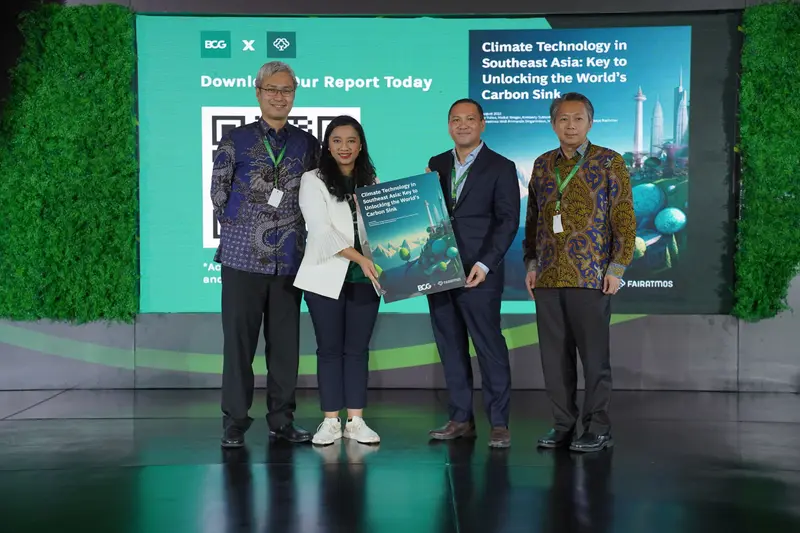Fairatmos and BCG Report Uncovers Climate Technology in Southeast Asia's Role in Unlocking the World's Carbon Sink
News

On August 9th 2023, climate technology pioneer Fairatmos, whose mission is to facilitate the development of quality carbon offsets, in collaboration with the Boston Consulting Group (BCG), released a report revealing the immense opportunities that the Southeast Asian region has in addressing climate change through the utilization of innovative climate technology and nature-based solutions. In an era where the impacts of climate change are becoming more apparent, efforts to address this challenge are becoming more urgent.
Climate technologies and nature-based solutions (NbS) are also increasingly being developed and are becoming critical elements in reducing greenhouse gas emissions and mitigating the impacts of climate change. In this context, collaboration between climate technology companies and strategic consultants is essential in identifying potential and opportunities. So, what is the content of the report on climate technology titled Climate Technology in Southeast Asia: Key to Unlocking the World’s Carbon Sink, which is the latest release?
3 Potential Nature-Based Solutions (NbS) in Southeast Asia in the Climate Technology Report by Fairatmos and BCG Collaboration
Here are three potential Nature-Based Solutions (NbS) and opportunities that the Southeast Asia region has in the climate technology report:
1. Global Carbon Offset Supply Potential
Southeast Asia has the potential to contribute around 30% of global carbon offset supply by 2030, despite covering less than 1% of the world's total land area. This potential can be harnessed through nature-based solutions (NbS) in the region that can significantly contribute to reducing greenhouse gas emissions.
Carbon offsets are a way to reduce greenhouse gas emissions by paying incentives to carbon sinks, such as forests or wetlands. In this regard, NbS can be integral in achieving climate change and sustainable development goals. NbS can be a cheaper and more effective alternative to traditional carbon technologies.
2. Nature-Based Solutions (NbS) as an Integrated Approach
The climate technology report also explains that Nature-Based Solutions (NbS) is an integrated approach to addressing environmental, social, and economic issues. The concept incorporates the principles of nature and ecosystems to mitigate the impacts of climate change. NbS can also provide significant economic and social benefits to local communities.
NbS goes beyond traditional biodiversity conservation and management principles by refocusing the debate on people and the environment. Nature-based solutions such as reforestation, forest planting, wetland restoration, and sustainable agriculture can all contribute to carbon storage and biodiversity preservation.
3. Economic Growth and Green Investment
The report on climate technology also highlights the potential for green economic growth in Southeast Asia and green investments that are starting to gain attention from governments and companies in the region. Southeast Asia's projected economic growth is high, with a potential gross domestic product (GDP) growth of 4.6% by
In this context, green investments can help accelerate the widespread adoption of NbS projects in the region. They can help finance NbS projects and accelerate the development of technologies and infrastructure needed to implement NbS. Despite the financial challenges, green investments are gaining attention from governments and regional companies.
Contribution of Nature-Based Solutions (NbS) in Southeast Asia to Net-Zero
Nature-Based Solutions (NbS) can significantly contribute to achieving the net-zero target of reducing greenhouse gas emissions to zero by 2050. Here are some of the contributions of NbS toward net zero:
1. Emissions Mitigation with Nature-Based Solutions (NbS)
The climate technology report also reveals that Nature-Based Solutions (NbS) have the potential to significantly contribute to achieving net-zero emissions. The incredible potential of NbS for mitigating CO2 emissions is genuinely remarkable. Experts estimate it could reduce 60% of projected emissions by 2030, which is an outstanding accomplishment. With this kind of progress, we can look forward to a brighter, cleaner, more sustainable future.
2. Global Carbon Offset Potential
At a relatively affordable cost, Nature-Based Solutions (NbS) also have the potential to provide a significant global supply of carbon offsets by 2030. This report projects the supply of carbon offsets from NbS to reach 700 to 1,000 Mt CO2e/year globally. Southeast Asia expects to contribute 200 to 300 Mt CO2e/year despite covering only 0.7% of the world's total land area.
3. Identifying Challenges and Barriers
Despite its great potential, the report identifies challenges in the Nature-Based Solutions (NbS) value chain. Issues of project transparency, demand visibility, and quality assurance are barriers that need to be solved collaboratively to harness the full potential of NbS in Southeast Asia in the face of climate change.
Fairatmos and BCG call on all stakeholders, from technology providers to governments and corporations, to collaborate in addressing climate change. Southeast Asia has a vital role in embracing a sustainable future by harnessing the tremendous potential of Nature-Based Solutions (NbS).

